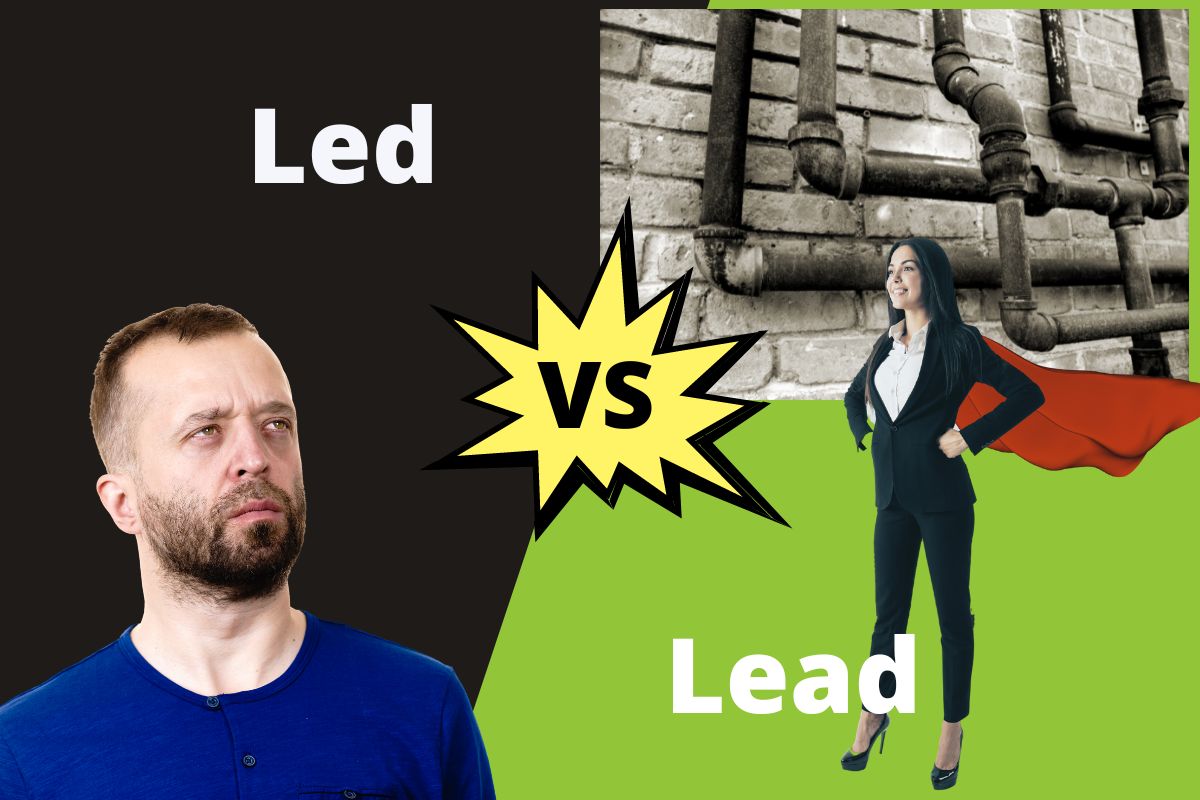The difference between lead and lead is that, as a verb, lead means to guide or show. As a noun, lead means the metallic element or the foremost position. But led is the past tense of the verb lead.
Led and lead are homophones. You cannot use the words interchangeably because it will change the entire meaning of the sentence. So you must know the difference between lead and led.
Table of Contents
Led vs Lead
| Led | vs | Lead |
| Led is the past form of lead, and it means guiding or directing | Definition | Lead is a metallic substance. It is also the present tense of the verb and means guiding or directing some activity. The noun of the word also means being ahead or in the front position |
| Verb | Parts of speech | Verb, noun, adjective |
| Led is pronounced as \led\ | Different pronunciations | Lead is pronounced as \leed\, and \led\ |

What Does Led Mean?
Led is the past tense form of the verb lead. It also means directing or guiding. There is no noun form of the verb led.
Led is also the past participle form of the verb lead.
Examples
- Last night he led me to my home.
- Dogs get excited easily, so they should always be led with a leash.
- The tour guide led us through a forest to show us the waterfall.
- She led a tough life which made her inhuman.
- He would have led her to the forest if he intended any harm.
What Does Lead Mean?
You can use the word lead as a noun, adjective, or verb. The meaning of lead differs based on which parts of speech you use.
Lead as a Verb
As a verb, lead means the action of guiding, operating, or directing some activity. It also means to bring forth or usher.
Examples
- He will lead the march.
- Job layoffs often lead to depression.
- Hard work and dedication can lead us to victory.
- I don’t have any fault; I didn’t lead her into the situation.
Lead as a Noun
When we use lead as a noun, it means metallic element or a foremost position.
Examples
- Exposure to even low levels of lead can cause serious physical harm.
- The manager met with an accident; now, you must take the lead.
- Everybody followed his lead without any protest.
- Howard could use the lead to resolve the case.
- The president asked Congress to lead the way in the country’s progress.
Lead is the present tense of the verb, and we use it when we have to talk about directing and guiding someone or some activity.
But if you have to talk about a foremost position or a heavy metal like a lead pipe, we use the noun form of the word.
Idiomatic Uses
Apart from these literal uses, there are many idioms with the word lead.
Examples
- You can lead a horse to the stream but cannot make it drink the water.
- All roads lead to Rome.
- Crosses are ladders that lead to heaven.
- Get the lead out of (someone’s) feet.

Led vs Lead: What Are The Main Differences?
The following are the main areas of difference between led and lead-
Parts of Speech
The parts of speech of lead and led is one of the main differentiating factors. Lead is used as a verb, noun, and adjective.
But led is only used as a verb. It is the past and past participle of the present tense of the verb lead.
Different Pronunciations
The pronunciations of lead and lead are also quite different. When it means on the front or leading someone, it is pronounced as- \leed\, and when it implies metal, we pronounce it as- /led/.
Led is pronounced the same way the spelling looks like- \led\. The pronunciation does not vary.
Different Meanings
The meanings of lead and led are different.
We use lead as a noun it to mean heavy metals, and as a verb, it means to guide.
The meaning of led is somewhat similar to the verb form of lead but does not match the noun.

Key Differences Between Led and Lead
Example sentences
- She will lead the procession.
- Staying consistent will lead us to success.
- Her mother’s death has to lead her to depression.
- Lead is a harmful metal to our health.
- Small children should not be exposed even to low levels of lead.
- I will lead you to the right path.
- You cannot lead the march without the general’s permission.
- She led an honest life.
- What led you to suspect that?
- He led the blind man across the street.
- She led us to her home.
- He led the chickens to their birdhouse.
- I was led through a very dark corridor.
- The superintendent led a corrupt life.
- He led a very boisterous life in his youth.
If you’ve found this article useful, check out our post comparing sell versus sale.

